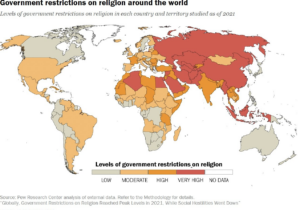The brutalities endured by Burma’s Rohingya—the country’s most vulnerable population—were bad even before the recent coup. The US response must take their plight into account, or risk making it even worse.
On February 1, Burma’s military overthrew its civilian government in a coup shortly after the November general election in which the National League for Democracy (NLD), led by Aung San Suu Kyi, won a landslide victory. Since then, the Burmese military has used a heavy-handed approach in cracking down on dissent through telecommunications outages, social media bans, and detaining nearly 325 political prisoners, including Suu Kyi. Given the military’s repressive response, the question of what will happen to the Rohingya is especially pressing.
The Rohingya, a Muslim ethnic minority in Burma, have experienced renewed persecution by the Burmese military since August 2017, when the army launched a campaign of so-called “clearance operations” against them. In August 2018, United Nations investigators declared that these events, which involved mass killings, gang rapes, and other brutalities, exhibited “genocidal intent,” while a January 2020 International Court of Justice ruling ordered Burma to take emergency measures to stop the persecution. Despite this, over 10,000 Rohingya have been killed since 2017, while 900,000 have fled to neighboring Bangladesh, and 600,000 currently remain at-risk in Burma.
The military coup is especially alarming as Commander-in-Chief Min Aung Hlaing has seized complete control of the state. Min Aung Hlaing, who was sanctioned by the US government in 2019, has been identified among the military officers most responsible for atrocities carried out against the Rohingya.
After the coup, many Rohingya fear they will become top targets of a military desperate to display its power. These anxieties are echoed by Burmese Rohingya Organization UK president Tun Khin, who stated to The Washington Post, “This military is very brutal, and Rohingya worry that the military may commit more violence against Rohingya.”
Meanwhile, Rohingya refugees at Cox’s Bazar, Bangladesh—the world’s largest refugee camp— are uncertain how the coup will affect plans to repatriate them back to Burma. Complications introduced by the pandemic and the recent coup make it even more important to ensure that any attempted returns from Bangladesh to Burma are done in a safe and voluntary fashion.
In response to the coup, the Biden administration undertook a review of US sanctions toward the country and recently issued a new executive order drawing on broad powers to target individuals and entities inside of Burma for their involvement in the coup and other abuses. The administration already issued a first round of designations, which unfortunately stopped short of targeting key military-owned enterprises, MEC and MEHL (although they did target MEHL subsidiaries).
Sanctions action was the right first step to respond swiftly to recent events, but there are other actions that should be considered as well. The new administration also redirected more than $42 million in assistance given to the Burmese military to the Burmese people.
Given that Rohingya are at particular risk, the US government should consider prioritizing them, especially Rohingya left behind in the country in internally displaced persons camps and in Rakhine State. Particular policy solutions should include issuing an atrocity determination saying whether genocide and crimes against humanity were carried out by the Burmese military in 2017. The Biden administration should also consider extending Priority-2 refugee status.
Finally, the Biden administration should make clear that now is the wrong time for the government of Bangladesh to carry out repatriation efforts of Rohingya to return to Burma and reiterate that any attempts at repatriation must be voluntary and safe.
Current conditions in the country put already at-risk populations potentially further at risk. After first steps have been taken, future US policymaking should be conducted comprehensively, and with vulnerable populations, like the Rohingya in mind. The plight of the Rohingya, both those still in Myanmar and those across the border in Bangladesh, merit a strong US response.








 Sponsor a student for Christianity & National Security 2024
Sponsor a student for Christianity & National Security 2024